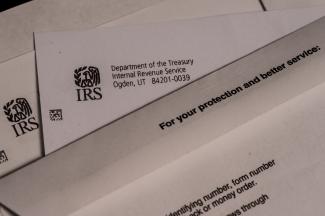
Come Out With Your Hands Up
“Notice of intent to seize (levy) your property or rights to property.”
That was the first line of the letter I recently received from the Internal Revenue Service.
It continued.
“This is a notice of intent to levy your property or rights to property. As we notified you before, our records show you have unpaid taxes for the period ending December 31, 2020 (Form XYZ). If you don’t call us immediately to make payment arrangements or we don’t receive the amount due within 30 days from the date of this notice, we may levy your property or rights to property and apply it to the amount you owe.” (emphasis mine)
With the federal government, there is no quiet interrupting cough and a polite “Excuse me, we think that you forgot to pay us something here.”
No. If the IRS thinks you are in the wrong, they hit you with a sledgehammer.
Of course, in this crazy COVID world, I’ve never received a prior notice. Not a single one. That’s been pretty common in the last 18 months. I’ve seen double-notices, ignored notices. . . I even saw the IRS hold a tax payment check for 8 months then return it to a client telling them the check was no good and they owed all sorts of penalties. It wouldn’t surprise me to get the initial notice - dated months ago - in the mail in the next few days.
And as you can tell, I’m not panicking.
Why?
Because this is normal procedure for the federal government. And most state revenue agencies as well.
What they’ve discovered is this: If they politely ask you to fix a problem, there is a slim chance you will take corrective action. It isn’t a priority. But if they threaten you with all but bodily harm, the vast majority of Americans will address the problem quickly. Because no one wants to be on the wrong side of the IRS.
So why am I telling you all of this?
Because there’s probably a 50/50 chance that someday you’ll receive a notice just like this one. And it would be great to know what to do should you be one of the unlucky ones to receive such a notice.
Our Game Plan
First - don’t panic. I know, easier said than done. But don’t panic. Ignore all of that “in the next 30 days or we’re going to send in the paddy-wagon” stuff. You watch crime shows on TV. (My favorite is reruns of the original Law & Order. Duhn-duhn!) How often do deadlines matter if you are working with the authorities?
Years ago, I got a similar notice. The IRS was dead wrong. They claimed I owed them literally tens of thousands of dollars. We went back and forth for over three months. It’s important to reach out within 30 days, but the matter does not have to be settled in that time span.
Second - get your ducks in order. Pull your tax returns. Find out why the IRS is claiming you owe them money. Sometimes, you forgot to file a form. Other times, they just made a mistake. Or your CPA might have made a slip-up. Or. . . you legitimately owe the money.
Find out. Where is the problem? Once you know the problem you can decide how to tackle it.
Third - take action. If the error is your fault and you legitimately owe the money, start writing the check. It’s easier to just pay than to explain, then pay. You want to minimize the contact you have with the IRS. The more contact, the more chance they will make a mistake in your file.
If the error is with your CPA, contact them and have them correct it. You will still owe the rightful taxes, but the situation needs to be rectified by a professional.
This leaves us with two other choices - the IRS legitimately made a mistake or perhaps ignored one of your forms.
In both cases, this will require you to reach out and contact the IRS. It will likely be more than one contact. If you have a CPA, let them handle it. They are experienced in working with the IRS. They speak the same language. Let them handle the problem.
This is the most time-consuming route to go. Because the IRS will have to review your information and decide if they agree or not. (That’s what happened to me way-back-when. It was clear that I did not owe the money, but the IRS was unwilling on a regular basis to agree that the error was theirs.)
Keep on top of the situation, but do not be surprised if your CPA is working hard and you continue to get threatening letters from the IRS.
In time, even the worst cases will end. And the likelihood of it being ugly is actually rather slim. Just remember that thousands of these notices are sent out every day. So if you get one, you aren’t really all that special and no one is out to get you.
Thanks for taking the time to read our blog this week. If you have any questions or concerns, please don’t hesitate to email us at dennis@successfulmoney.com or call us at (800) 453-3209. If you don’t already have a copy of my book, The Biggest Financial Mistakes Retirees Make, you can order it on Amazon or click here and we will get a copy out to you, free of charge!
To receive blog updates via email, click here.
This blog is the opinion of Successful Money Strategies, Inc. and is provided for informational purposes only and is not intended to provide any investment advice or service. Statistics and other figures are accurate at the time of original publishing. Any advice herein should not be acted upon without obtaining specific advice from a licensed professional regarding the readers own situation or concerns. Always count your change

